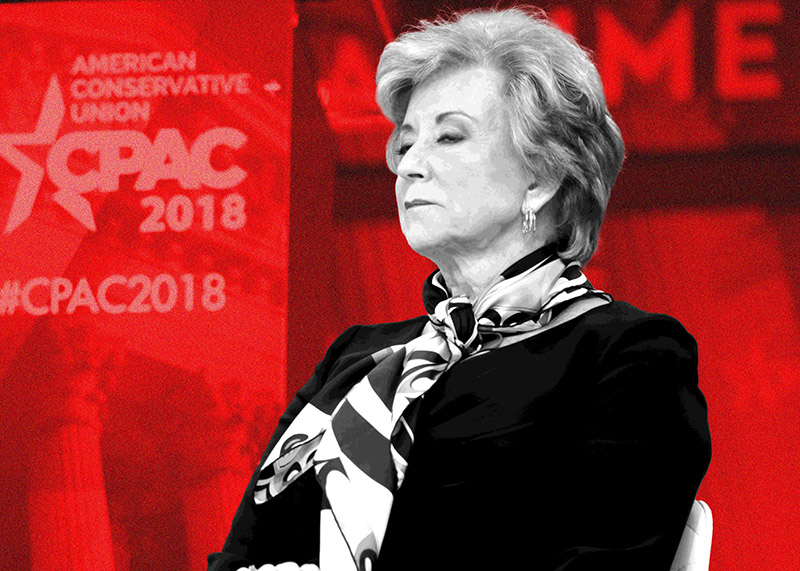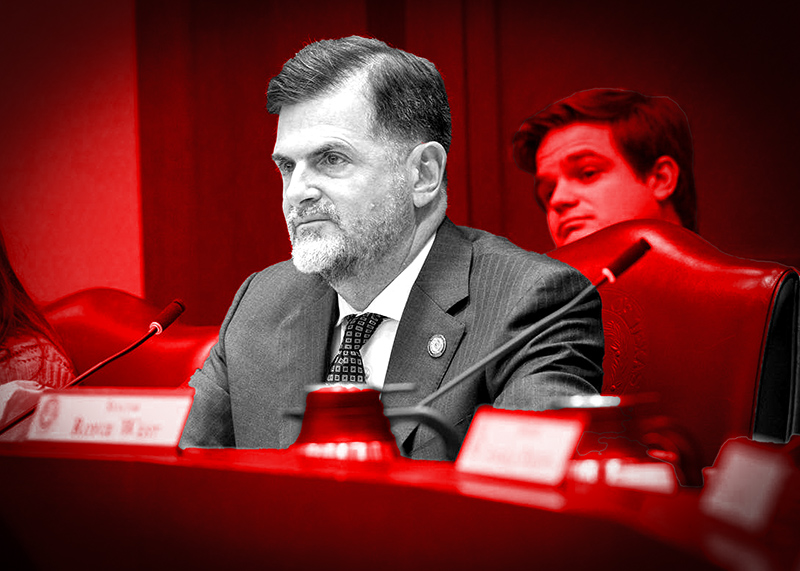Florida’s “Don’t Say Gay” Law Is Now in Effect
Teachers claim they're being advised to take down rainbow symbols, "Safe Space" stickers, and remove LGBTQ books from shelves.

Florida’s controversial “Don’t Say Gay” law has officially gone into effect, at least partially, as of Friday morning, leaving teachers scrambling to comply with what they believe they law requires of them — even though the state Department of Education has yet to provide any guidance.
The “Parental Rights in Education” bill, which was pushed by Republicans in the state legislature as a priority this session, prohibits classroom discussion of LGBTQ-related issues in grades K-3, and declares that any instruction in older grades dealing with LGBTQ topics, or using books that center or even merely reference LGBTQ characters, must be “age-appropriate or developmentally appropriate.”
The law is only partially in effect at the present moment, with the K-3 restrictions having taken effect after the stroke of midnight. But the restrictions on LGBTQ-related content in older grades cannot take effect until the Florida Department of Education develops rules and guidance and define what constitutes “age-appropriate or developmentally appropriate instruction” for middle and high school classes. The department has until June 30, 2023 to develop those standards.
Already, individual school districts are imposing restrictions designed to force teachers into compliance with the law. Last week, attorneys for Orange County Public Schools, in the Orlando area, held seminars advising principals what behaviors would or would not be legal under the law.
According to representatives of the county’s teachers association, teachers and staff members will not be allowed to wear rainbow articles of clothing, including lanyards distributed by the district last year. They will also not be allowed to post “Safe Space” stickers in elementary classrooms — lest the stickers inadvertently prompt students to raise LGBTQ issues in class — and any already posted in classrooms will have to be taken down.
Teachers were reportedly advised not to put pictures of their same-sex spouse on their desk or talking about them to students, must refer to all students by the pronouns that match their assigned sex at birth, and must inform parents if a student “comes out” to them, reports Orlando-based ABC affiliate WFTV.
A representative for Orange County Public Schools confirmed that district officials held three separate seminars at Apopka High School last week, but disputed the content of the seminars, arguing that the advice provided in the session was not official guidance, but was simply meant to illustrate examples of how the law might be applied.
“During the presentation, administrators posed hypothetical scenarios based upon the new statutes and verbal answers were provided based on the limited guidance from the Florida Department of Education,” the spokesman said. “Once further guidance is received from the Florida Department of Education, the district will provide formal guidance to administrators and staff.”
A separate OCPS official told WFTV that the district needed to err on the side of caution until the Department of Education develops official guidance. The strict interpretations mentioned in the hypothetical scenarios are necessary to protect teachers, to avoid the possibility of having their teaching licenses revoked if they are accused of running afoul of the law — whether or not they actually did.
Andrew Spar, the president of the Florida Education Association, told The Hill that fear of being terminated will likely lead many districts to be extra cautious and ban any and all conversations relating to LGBTQ topics.
Although topics related to sex education are not taught until fifth grade, and do not include lessons on sexual orientation or gender identity, according to Spar, some pupils may raise LGBTQ-related issues without prompting. But Republican lawmakers have insisted that any discussion of such issues among minors — especially without their parents’ permission — is inappropriate, and underscore the need for the law.
Other school districts are also taking action that critics say goes beyond what the law requires. In Leon County, which includes the city of Tallahassee, the school board approved its “LGBTQ Inclusive School Guide,” which includes a provision to alert parents if a student who is “open about their gender identity” may be in a physical education class or attending an overnight class trip with their children, reports NBC News.
“Upon notification or determination of a student who is open about their gender identity, parents of the affected students will be notified of reasonable accommodation options available,” the policy reads. “Parents or students who have concerns about rooming assignments for their student’s upcoming overnight event based on religious or privacy concerns may request an accommodation.”

Last month, the Palm Beach County School district sent out a questionnaire asking its teachers to review all course material and remove any books with references to sexual orientation, gender identity, or race. Florida recently passed another law, the “Stop Woke Act,” which purports to target so-called “critical race theory” in classrooms, but, in practice, bans any material that acknowledges the country’s fraught history of race relations or can even be perceived as being critical of the United States or its founders.
As a result of the purge, at least two books — I Am Jazz and Call Me Max — were pulled from school library shelves in Palm Beach County because they deal with transgender characters and gender identity. Michael Woods, a special education teacher in the county who is openly gay, said many of his colleagues are nervous about being reprimanded if they miss a book that has LGBTQ content or characters.
“I’ve had colleagues say to me, ‘Well, I’m just going to pack all of my books away and not have any out at all,'” Woods told NBC News. “That sounds like a knee-jerk reaction, but when you’re in that situation, it’s just one more stressor that you’re going to put on yourself. And is that really the hill you want to die on?”
In an email to NBC News, Alex Lanfranconi, the director of communications for the Florida Department of Education, said “accusations regarding the implementation” of the new law are “fake news.”
“It’s no surprise that activists and teachers’ unions are creating a false narrative to sow confusion among the public,” Lanfranconi said. “HB 1557 prohibits classroom instruction on sexual orientation and gender identity in Grades K-3.”
The law is currently being challenged in court by a coalition of parents, students, and LGBTQ groups, who argue that the law is unconstitutional and discriminatory.
But Attorney General Ashley Moody’s office has asked a federal judge to dismiss the lawsuit, claiming that the plaintiffs don’t have legal standing to sue, that the state has the right to set curricula for public schools, and that the plaintiffs’ claims about the law’s effect are exaggerated and overblown, according to CBS News. In a motion to dismiss, the attorney general argues that those suing have not proven that state lawmakers “acted out of animus against LGBTQ individuals.”
“Falsely dubbed by its opponents the “Don’t Say Gay” bill, HB 1557 is nothing of the sort,” the motion reads. “Far from banning discussion of sexual orientation and gender identity, the legislation expressly allows age- and developmentally appropriate education on those subjects. Consistent with that modest limitation, the law prohibits classroom instruction on sexual orientation and gender identity for the youngest children, neutrally allowing all parents, no matter their views, to introduce those sensitive topics to their children as they see fit.”
Brian Kerekes, a math teacher in Osceola County, in the Orlando suburbs, told NBC that the lack of clear guidance has teachers confused about their responsibilities under the law.
“We’re just caught in the middle trying to figure out what is and isn’t OK while still trying to do what is our primary function, which is supporting our students and giving them a safe space to learn,” he said. “It’s going to be a mess.”
Kerekes also predicted that districts will begin refusing to renew the contracts of teachers accused of flouting the law, even when they are found not to have. Because the law allows parents to sue if they believe their children have been exposed to inappropriate content, and districts cannot recoup legal fees even if the lawsuit is decided in their favor, administrators may find keeping around a particular employee creates too much controversy and fire them.
“Even if an investigation turns out to be bogus, a principal could still decide that it just isn’t worth having the teacher around anymore and just drop them,” he said. “I just worry that we’re going to be spending our time on nonissues instead of doing our jobs.”
Support Metro Weekly’s Journalism
These are challenging times for news organizations. And yet it’s crucial we stay active and provide vital resources and information to both our local readers and the world. So won’t you please take a moment and consider supporting Metro Weekly with a membership? For as little as $5 a month, you can help ensure Metro Weekly magazine and MetroWeekly.com remain free, viable resources as we provide the best, most diverse, culturally-resonant LGBTQ coverage in both the D.C. region and around the world. Memberships come with exclusive perks and discounts, your own personal digital delivery of each week’s magazine (and an archive), access to our Member's Lounge when it launches this fall, and exclusive members-only items like Metro Weekly Membership Mugs and Tote Bags! Check out all our membership levels here and please join us today!
































You must be logged in to post a comment.